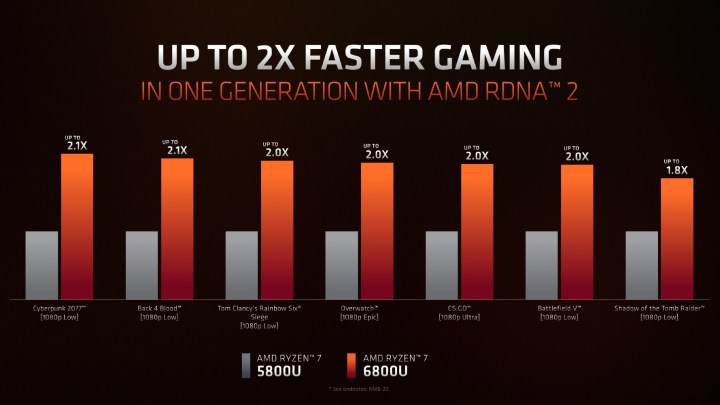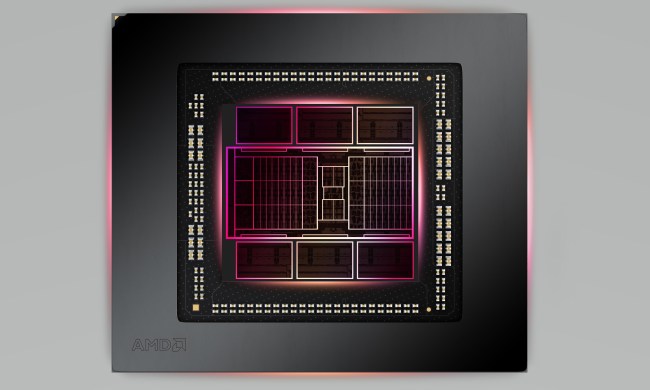AMD has announced the Ryzen 6000 mobile processors at CES 2022, for both gaming and consumer laptops.
The new chips don’t reinvent anything architecturally over Ryzen 5000 but instead, build on the success of those CPUs with a focus on better power efficiency and vastly improved integrated graphics.

Here’s what the stack of Ryzen 6000 chips looks like, all based on an improved Zen 3+ core.
| Cores/Threads | GPU cores | Cache | Base Clock | Max Boost | Graphics Max Boost | TDP | |
| Ryzen 9 6980HX | 8/16 | 12 | 20MB | 3.3GHz | 5.0GHz | 2.4GHz | 45w+ |
| Ryzen 9 6980HS | 8/16 | 12 | 20MB | 3.3GHz | 5.0GHz | 2.4GHz | 35w |
| Ryzen 9 6900HX | 8/16 | 12 | 20MB | 3.3GHz | 4.9GHz | 2.4GHz | 45w+ |
| Ryzen 9 6900HS | 8/16 | 12 | 20MB | 3.2GHz | 4.9GHz | 2.4GHz | 35w |
| Ryzen 7 6800H | 8/16 | 12 | 20MB | 3.2GHz | 4.7GHz | 2.2GHz | 45w |
| Ryzen 7 6800HS | 8/16 | 12 | 20MB | 3.3GHz | 4.7GHz | 2.2GHz | 35w |
| Ryzen 5 6600H | 6/12 | 6 | 19MB | 3.3GHz | 4.5GHz | 1.9GHz | 45w |
| Ryzen 5 6600HS | 6/12 | 6 | 19MB | 3.3GHz | 4.5GHz | 1.9GHz | 35w |
| Ryzen 7 6800U | 8/16 | 12 | 20MB | 2.7GHz | 4.7GHz | 2.2GHz | 15-28w |
| Ryzen 5 6600U | 6/12 | 6 | 19MB | 2.9GHz | 4.5GHz | 1.9GHz | 15-28w |
AMD has four Ryzen 9 chips that lead off the pack, still sporting eight cores and 16 threads. The cache remains the same too at 20MB for the Ryzen 9 and 7 configurations, and 19MB for Ryzen 5.
You do, of course, get the bump to the max boost speeds on the two highest SKUs, finally hitting 5.0GHz, which feels like an important mile marker for AMD.
It feels particularly significant on the HS-series chips, which are limited at 35 watts. These are the types of chips we see pop up in thin and light gaming laptops, some in smaller 14-inch form factors such as the ROG Zephyrus G14.
But how about U-series chips? These are limited to a smaller power envelope, the kind of processors you’ll find in 13-inch ultrabooks or commercial laptops. Here, AMD only has two chips, which keeps things simple. I have my eye on the Ryzen 7 6800U, which is bound to be a popular processor choice in laptops in 2022 with its 8 CPU cores and 12 GPU cores. That’s four additional GPU cores over last year’s model.

The result, according to AMD, is an average of 1.3x improvement gen-over-gen. Using PugetBench’s Adobe Premiere Pro benchmark, AMD says its Ryzen 7 6880U is 1.69 times faster at video encoding than the Ryzen 7 5800U, which is already a fast processor for video encoding.
In raw benchmarks, AMD also claimed some impressive gen-over-gen improvements in Cinebench R23 — an 11% increase in single-threaded and 28% in multi-threaded.
All of these new Ryzen 6000 chips are built on TSMC’s new 6nm process, which provides improved performance per watt. To get even better battery life, Zen 3+ adds additional deep sleep states and enhanced power management features. The result? Well, AMD claims these new Ryzen 6000 laptops can get up to 24 hours of battery life in video playback. That’s quite a claim.
RDNA 2 graphics

Look, integrated graphics aren’t exciting. It’s hard to get enthusiastic about integrated graphics — at least, it always has been in the past. But AMD is serious about its Ryzen 6000 graphics this time around, and with RDNA 2 as the architectural foundation, it’s hard not to get my hopes up.
Throw in the fact that these are the first integrated graphics with hardware ray tracing, and you’ve got my attention.
RDNA 2 is the same architecture used in AMD’s Radeon 6000 discrete graphics, as well as in the Xbox Series X and Playstation 5. It’s scaled back here, obviously, but if we can believe AMD’s performance charts, these might be the most powerful integrated graphics ever made. That is, if you count out Apple’s M1 Pro and M1 Max.
Up against Intel’s 11th-gen integrated graphics, AMD is showing some dramatic leads across a variety of titles. The Ryzen 7 6800U even demolishes the Nvidia MX450 discrete GPU.

The most impressive graph is the comparison against the previous generation, Ryzen 5000. AMD is boasting an average of twice the frame rate across a fairly wide variety of titles.
Unfortunately, AMD did not provide actual frame rates for these games.
To take things even further, AMD showed off a demo of Far Cry 6 played on a Ryzen 6000 processor — and here, reported the frame rate. At 1080p Medium settings, the system was able to do an average of 59 frames per second in the game once combined with FidelityFX Super Resolution (FSR), which is now available on the U-series laptops for the first time. The upscaling tech provided a 51% boost to get the game awfully close to 60 fps.
That’s an ideal situation, of course, and it uses FSR to really get over the finish line. But Ryzen 6000 also boasts an impressive 2.25x the performance over the previous generation in 3D rendering, tested using the Blender GPU rendering benchmark.
Other features
There’s more here, of course. The new processors are the first to integrate Microsoft Pluton, the hardware-level security chip for “chip-to-cloud” security.
In terms of connectivity, Ryzen 6000 also supports USB4, Wi-Fi 6E, and DDR5 memory.
Where can you get it?
AMD highlighted the ThinkPad Z laptops from Lenovo, which has been co-developed between the two companies and uses a Ryzen Pro processor.
AMD also highlighted some more powerful options, such as the ROG Zephyrus G14, Lenovo Legion 5 Pro, and Razer Blade 14, which use the HX-series chips alongside discrete graphics.
These laptops and more will start shipping at the beginning of February.



